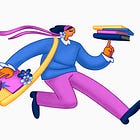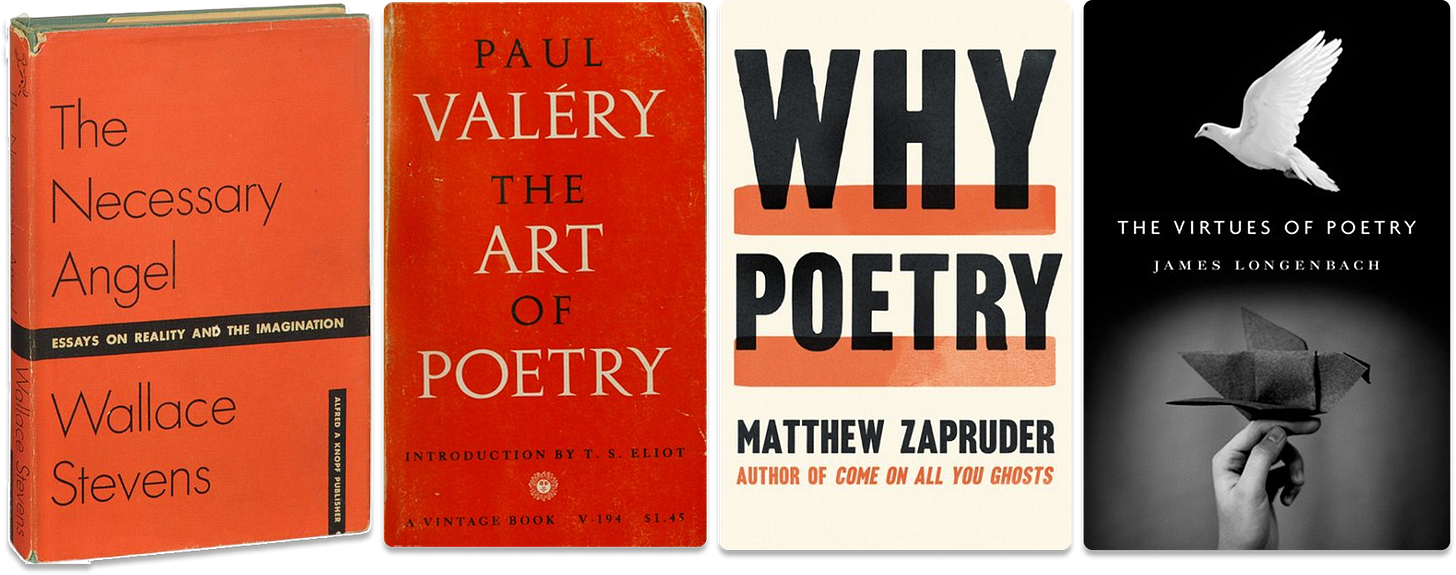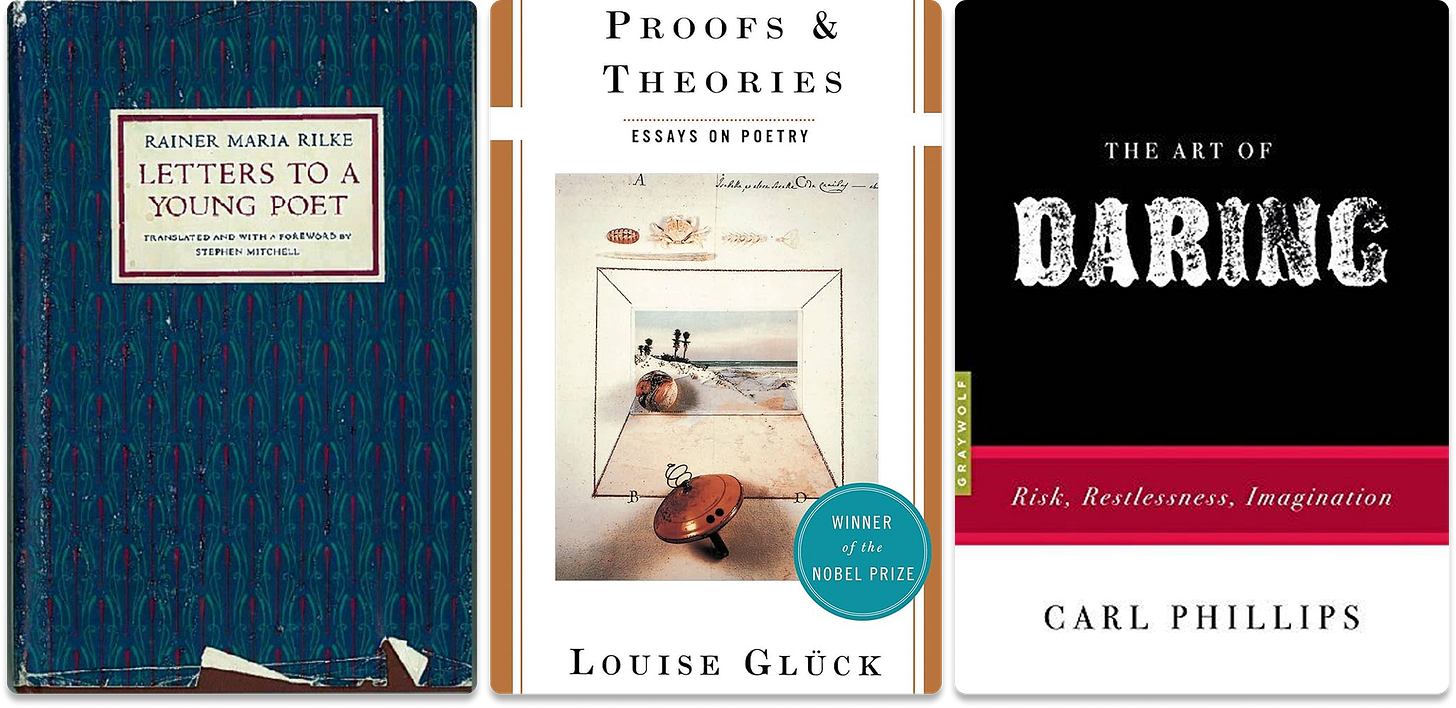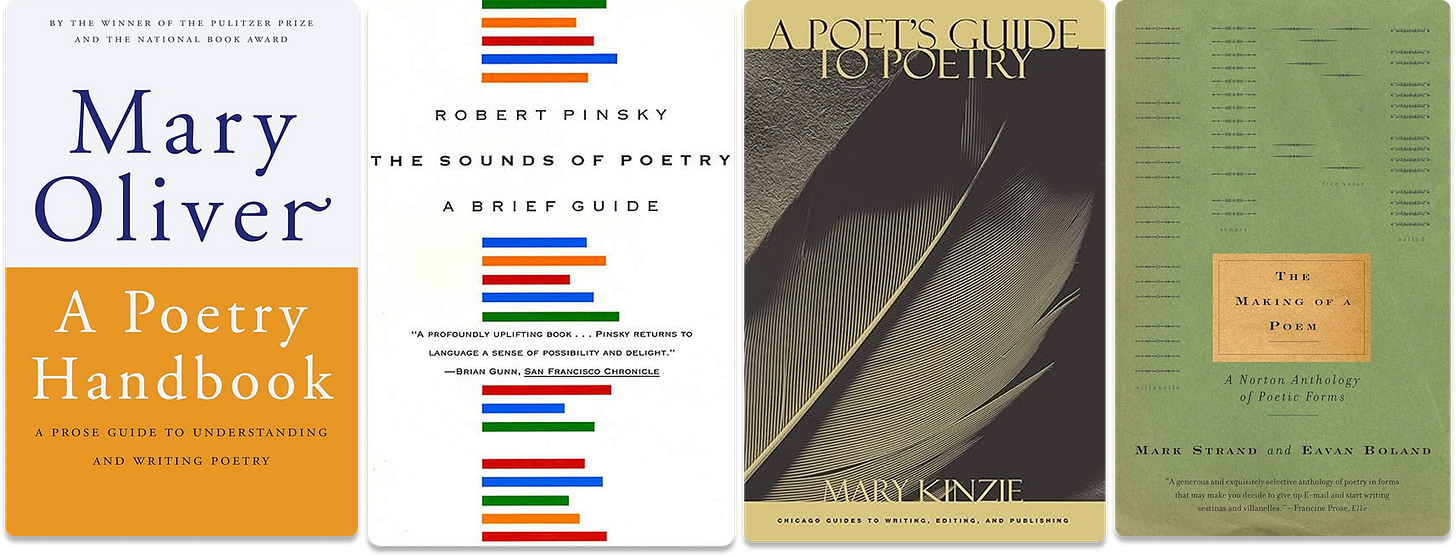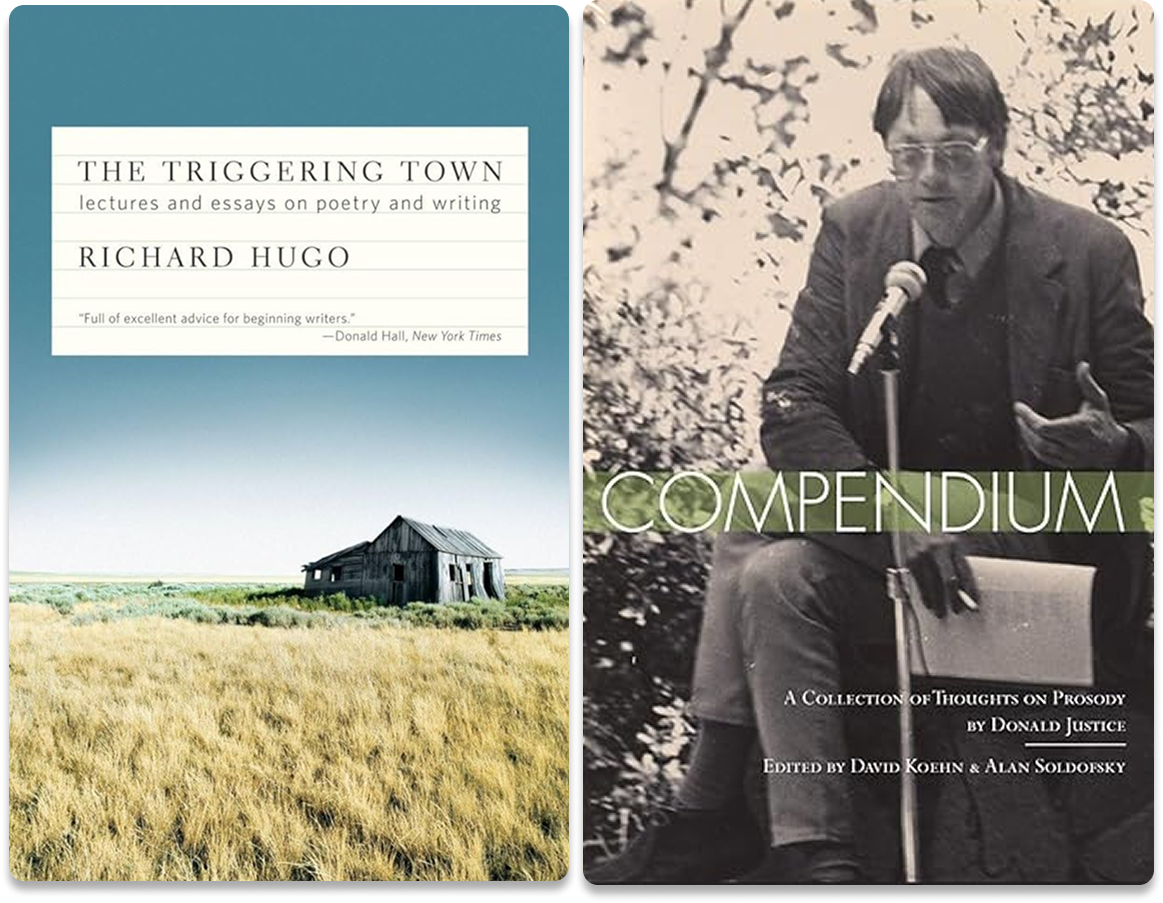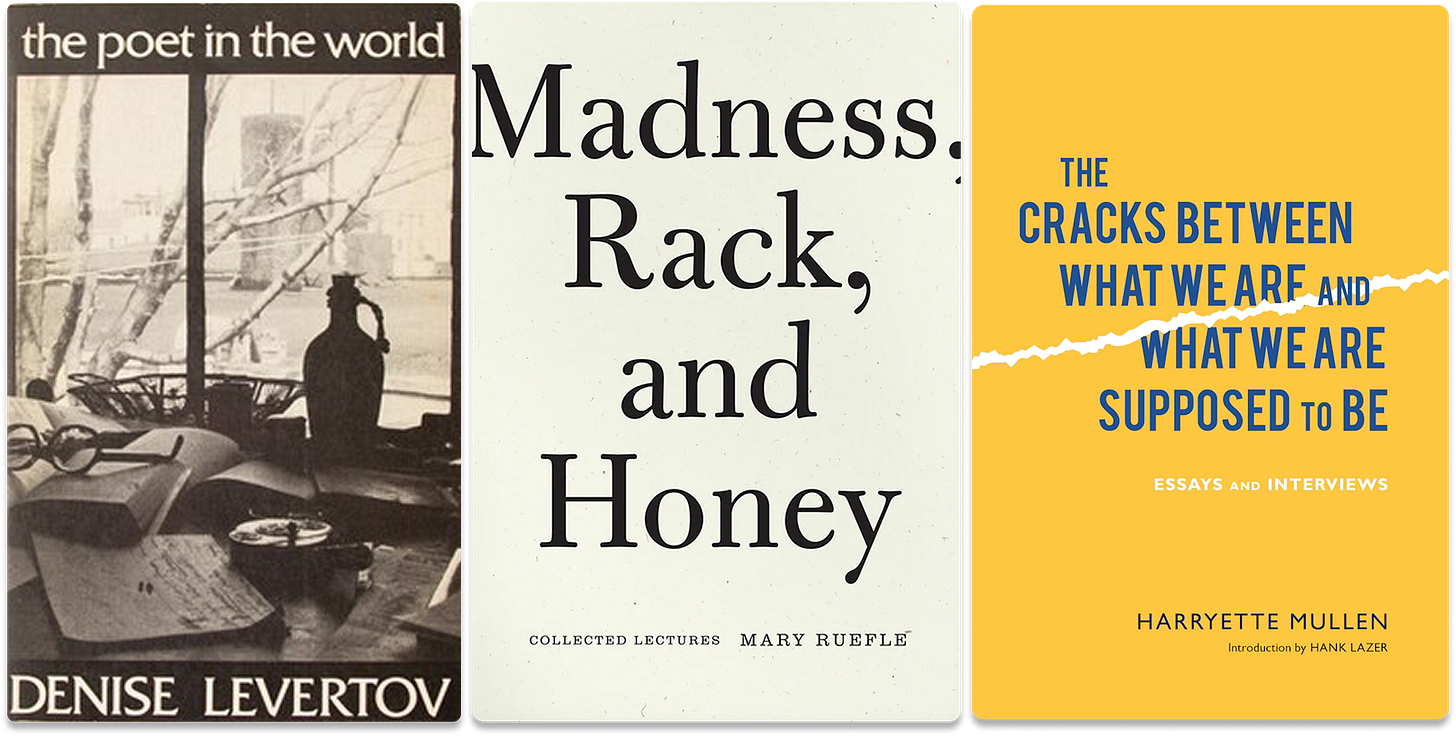Dear friends,
Last week I shared this:
And frankly, I’m surprised that over half of you didn’t just fuck right off. I’m so grateful for the wonderful response and that you’re still here. In fact, 743 more of you now than when I sent that post. Which is insane to me.
I’ll kick off the first section of The Only Poetry Curriculum: FOUNDATIONS by sharing an annotated guide to the best poetry craft books for anyone at any stage of their poetic practice.
I do want to share, for those of you who’re new to Beautiful Losers, that this Substack is a mix of my essays, poems, lists and now this curriculum. You can learn more about me here, or take a stroll through my notes.
TWO SHORT NOTES
✦ On Acquiring These Books:
While I’ll always encourage that we support writers and presses as we indulge in tangible literary pleasures by purchasing physical copies of the books we wish to read—I do understand that for some people this can be impossible. You might suggest, then, a visit to the local library and, yet again, I’m all for that….
However, let’s not forget that even this is a luxury and not readily available for everyone in all parts of the world. In the interest of my desire to make this course as accessible as possible, then, I’ll offer the following: if anybody would like any of the books here but cannot either a) afford to purchase their own copy or b) borrow from their library, please just email me here: shannan@onlypoems.net and let me know which book(s) you want—I’ll send you the relevant e-books.
✦ On Studying These Books:
Again, I’m still figuring out how to structure this curriculum, but here’s something that Karan Kapoor suggested I do, so I’m going to try it. Alongside other posts, every month I’ll choose one of these books and send out a lesson tailored around it. I’ll discuss my own insights from it, key quotations, as well as poetry exercises based on the book’s pedagogy to help your writing and reading.
Alright, on with it!
⟡ Foundations & Philosophy ⟡
The Necessary Angel by Wallace Stevens | Poetry’s relationship to reality and imagination. Stevens argues the poet must “move constantly in the direction of the credible” and “create his unreal out of what is real.”
The Art of Poetry by Paul Valéry | Composition as intellectual labor requiring formal discipline. Valéry insists great poems emerge from practiced exercises. And yet I love Valéry’s famous quote: “Poems are never finished—just abandoned.”
Why Poetry by Matthew Zapruder | A very accessible refutation of the idea that poetry is difficult and inaccessible. “Poets are alchemists of nothingness,” Zapruder argues, “they aspire to turn silence, nothingness, absence, into something palpable.”
The Virtues of Poetry by James Longenbach | Close readings of canonical poets showing how notions of excellence are fluid, never fixed. Longenbach critiques how “accomplishment in our poetry has been signaled most often by manner—as if it were the job of artists not to engage the most potent aspects of Dickinson or Eliot but to sequester themselves in one or another schoolroom.”
⟡ Wisdom & Mentorship ⟡
Letters to a Young Poet by Rainer Maria Rilke | A touchstone! Spiritual and artistic development is inseparable. Reread this one throughout your life while you “love your solitude and try to sing out with the pain it causes you.”
Proofs & Theories by Louise Glück | Rigorous yet intimate. On ambition, fear, and the examined poetic life. Essential counterpoint to more prescriptive approaches. Glück suggests “the desire to make art produces an ongoing experience of longing” and that “to perceive [art] at all is to be haunted by it.”
The Art of Daring: Risk, Restlessness & Imagination by Carl Phillips | Seven essays for poets afraid of their own boldness. Phillips posts on how the “poet possesses … an ability to be in the presence of troubling questions without giving in to the need to resolve them.”
⟡ Practice & Technique ⟡
A Poetry Handbook by Mary Oliver | Perhaps you think it might be a cliché to include this one, but truly a foundational education in poetry is incomplete without Mary Oliver. Here, she proclaims that “the poet must not only write the poem but must scrutinize the world intensely.”
The Sounds of Poetry by Robert Pinsky | A short guide on how sound creates meaning. Comparing poetry to dance, Pinsky posits that “the medium of poetry is a human body: the column of air inside the chest, shaped into signifying sounds in the larynx and the mouth.”
A Poet’s Guide to Poetry by Mary Kinzie | Comprehensive, encyclopedic volume chock full of lessons, descriptions, and definitions for all the technical elements that may make up a poem.ma
The Making of a Poem by Mark Strand & Eavan Boland | Anthology with craft notes; shows theory through example. Excellent for seeing how formal choices work in actual poems. “Form, in history and society, is not just a series of masterpieces. It’s also the reflex, the song, the choice, the backhand practice, the joyous enterprise of all poets at all times.”
⟡ Process & Prosody ⟡
The Triggering Town by Richard Hugo | Generative writing advice that feels like you’re listening to your favorite old professor. Give yourself permission to write badly and follow obsessions! “In the world of imagination,” Hugo declares, “all things belong.”
Compendium: A Collection of Thoughts on Prosody by Donald Justice | Aphoristic, gathered thoughts on prosody and composition. More reference than cover-to-cover read, I’d say, but something would be amiss here without this one.
⟡ Poetry’s Purpose & Power ⟡
The Poet in the World by Denise Levertov | Poetry’s political and social engagement and the poet as witness. Essential for understanding poetry’s civic function. In the titular essay, Levertov explains that “when words penetrate deep into us they change the chemistry of the soul, of the imagination. We have no right to do that to people if we don’t share the consequences.”
Madness, Rack, and Honey by Mary Ruefle | Playful, digressive, profound treatise on the mystery and (un)mastery of poetry. She shares: “I used to think I wrote because there was something I wanted to say. Then I thought, ‘I will continue to write because I have not yet said what I wanted to say;’ but I know now I continue to write because I have not yet heard what I have been listening to.”
The Cracks Between What We Are and What We Are Supposed to Be: Essays & Interviews by Harryette Mullen | On language, race, identity and experimental poetics as political practice. Mullen also has a keen eye on the future of poetry in connection with the powers that continue to recklessly shape our world.
And now, tell me:
Are there any books here that you’ve already read? If so, what are your favorite insights? Or things you disagree with? Perhaps you have other craft books you feel should have been included here. I’d love to hear from you in the comments!



